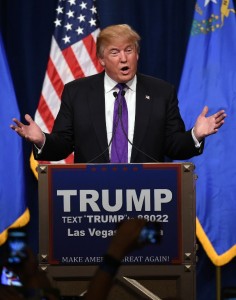
“We will be celebrating for a long time tonight,” Trump told cheering supporters in a victory speech.
The lopsided result underscored the enormous challenge Trump’s rivals face as the candidates head into next week’s all important “Super Tuesday” contests involving 11 states.
As early returns came in, CNN and Fox News had Rubio in second place with about 24 percent of the vote and Cruz in third place with about 21 percent.
Turnout was high, exceeding all expectations, with some caucus sites running low on ballots.
The remaining two candidates for the Republican presidential nomination, retired neurosurgeon Ben Carson and Ohio Governor John Kasich, came in at about six and four percent, respectively.
A triumphant Trump, who has alienated many Hispanic voters with his persistent anti-immigrant rhetoric, told supporters after his win that he was especially proud to have fared well with the Latino Republican voters in Nevada who overwhelmingly backed him.
And he told of how a wealthy friend wanted to donate $10 million dollars to his campaign but Trump said no because he is financing it himself.
“Every time I see him it’s hard for me to turn down money because that’s not what I’ve done my whole life,” Trump said.
“I grab and grab and I get greedy. Now we’re going to get greedy for the United States and grab and grab and grab,” he added.
The real estate mogul had been all but certain to triumph in Nevada, with the big question being whether Rubio — who is favoured by mainstream Republicans — could clinch second place.
The contest was the fourth for the Republican presidential candidates, with Trump so far winning in New Hampshire and South Carolina. He came in second in Iowa.
Although the caucus in Nevada is not expected to have a significant impact on the overall race — only 30 delegates or slightly more than one percent of the total are up for grabs — it was the first contest for the Republicans in the US West.
It is also the first test of Republican voter sentiment after Jeb Bush pulled out of the race last week following a poor showing in South Carolina.
And candidates here faced the most diverse electorate thus far in the race, more representative of the US population as a whole.
Experts said the focus was on whether Rubio and Cruz would be able to slow Trump’s momentum and which of the two candidates would come in second.
“Who is going to be the strongest guy to go against Trump… is going to be more clear after today,” said Dan Lee, assistant professor of political science at the University of Nevada, Las Vegas.
“Today we are going to see whether voters are going to move over more in support of Rubio.”
He noted that the Nevada caucus was taking place as mainstream Republicans are grudgingly accepting the fact that the bombastic Trump may well end up the party’s nominee given his seemingly unstoppable winning streak.
“A lot of Republicans — especially the Republican establishment, professionals, governors — don’t really want Trump to win the nomination,” Lee said.
“They want to get Cruz out and have Rubio go against Trump,” he added.
“A lot of people think it’s the best chance to beat Trump.”
– ‘Soft, weak, little baby’ –
The real estate magnate dished out his trademark rhetoric against his rivals ahead of the vote Tuesday, comparing Cruz to a “soft, weak, little baby” at a rally.
“But for lying, he’s the best I’ve ever seen,” he added.
Cruz fired back, accusing Trump of consistently vacillating on issues and saying his insults showed how rattled he was.
“@realDonaldTrump, showing class & grace, calls me a ‘soft weak little baby,'” Cruz tweeted. “Hope he doesn’t try to eat me!”
The Republican field, which once stood at 17, has shrunk to five, with Bush the latest to pull out on Saturday.
After Nevada, the real test on where the presidential candidates stand will come on March 1, when 11 states go to the polls in what is known as “Super Tuesday.”
Unlike primaries, caucuses allow participants to openly engage with one another and hear arguments from candidates’ supporters or surrogates, in meetings at schools, community centers and churches.
Republicans then vote by secret ballot, in 130 caucus sites across Nevada.
The results will be used to determine the number of Republican delegates who represent the state at the party’s nominating convention in July.
© 1994-2016 Agence France-Presse







